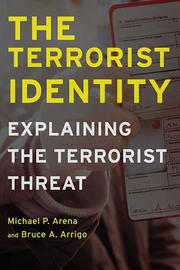| Listing 1 - 7 of 7 |
Sort by
|

ISBN: 0814707157 0814707165 9780814707159 9780814707166 1429486031 0814707815 Year: 2006 Publisher: New York : New York University Press,
Abstract | Keywords | Export | Availability | Bookmark
 Loading...
Loading...Choose an application
- Reference Manager
- EndNote
- RefWorks (Direct export to RefWorks)
"Arena and Arrigo give us a brilliant glimpse into the 'terrorist' psyche as they detail the creation and maintenance of identity in various terrorist organizations. Their conceptual framework has important implications for law enforcement, public policy makers, and academic researchers engaged in the study of terrorism." -Lynne Snowden, co-author of 'Collective Violence'"The overall quality of this book is astonishing, the ease of reading and the depth of theoretical knowledge, equally impressive. It is a valuable contribution to the terrorism literature and of such quality that it will be quoted, used, debated, and confronted by researchers for years to come. This book represents a vanguard of sociological thought on this subject and is a much needed voice in the debates on terrorism." -James David Ballard, author of Terrorism, Media, And Public Policy: The Oklahoma City BombingWho would strap a bomb to his chest, walk into a crowded subway station and blow himself up? Only by examining how a terrorist understands his own identity and actions can this question be answered. The authors of The Terrorist Identity explore how the notion of self-concept combined with membership in terrorist and extremist groups, can shape and sustain the identity of a terrorist as well as their subsequent justification for violence and the legitimacy of their actions.The book provides an understanding of identity that draws on concepts from psychology, criminology, and sociology. Notably, the book examines several case studies of various terrorist groups, including: the Provisional Irish Republican Army, Hamas, the Shining Path, the Liberation Tigers of Tamil Eelam, and racist Skinheads. By making the construct of identity central to this analysis The Terrorist Identity explains how violent and extremist collective behavior emerges culturally, how it informs the identity of group members socially, and how participants assume their place in these groups completely even at the expense
Group identity. --- Terrorism. --- Terrorists -- Psychology. --- Terrorism --- Terrorists --- Group identity --- Criminology, Penology & Juvenile Delinquency --- Social Welfare & Social Work --- Social Sciences --- Psychology --- Psychology. --- Terrorisme --- Terroristes --- Identité collective --- Psychologie --- Acts of terrorism --- Attacks, Terrorist --- Global terrorism --- International terrorism --- Political terrorism --- Terror attacks --- Terrorist acts --- Terrorist attacks --- World terrorism --- Direct action --- Insurgency --- Political crimes and offenses --- Subversive activities --- Political violence --- Terror --- Collective identity --- Community identity --- Cultural identity --- Social identity --- Identity (Psychology) --- Social psychology --- Collective memory

ISBN: 9780252072895 0252030516 0252072898 9780252030512 Year: 2006 Publisher: Urbana (Ill.) University of Illinois Press
Abstract | Keywords | Export | Availability | Bookmark
 Loading...
Loading...Choose an application
- Reference Manager
- EndNote
- RefWorks (Direct export to RefWorks)
Crime --- Criminology. --- Philosophy. --- Criminology --- Philosophy --- Mental philosophy --- Humanities --- Social sciences --- Criminals --- City crime --- Crime and criminals --- Crimes --- Delinquency --- Felonies --- Misdemeanors --- Urban crime --- Social problems --- Criminal justice, Administration of --- Criminal law --- Transgression (Ethics) --- Study and teaching --- Social aspects

ISBN: 1280633522 9786610633524 008046257X 012370510X 1493300814 9780123705105 9780080462578 9781280633522 6610633525 Year: 2006 Publisher: Amsterdam Boston, MA Academic Press
Abstract | Keywords | Export | Availability | Bookmark
 Loading...
Loading...Choose an application
- Reference Manager
- EndNote
- RefWorks (Direct export to RefWorks)
The Psychology of Lust Murder systematically examines the phenomenon of paraphilia (i.e., aberrant sexuality) in relationship to the crime of lust murder. By synthesizing the relevant theories on sexual homicide and serial killing, the authors develop an original, timely, sensible model that accounts for the emergence and progression of paraphilias expressed through increasingly violent erotic fantasies. Over time, these disturbing paraphilic images that, among other things, involve rape, body mutilation and dismemberment, torture, post-mortem sexual intercourse, and cannibalism, are al
Sex crimes --- Psychosexual disorders. --- Serial murderers --- Criminal psychology. --- Psychological aspects. --- Psychology. --- Criminal psychiatry --- Criminals --- Psychology, Criminal --- Disorders, Psychosexual --- Abuse, Sexual --- Sex offenses --- Sexual abuse --- Sexual crimes --- Sexual delinquency --- Sexual offenses --- Sexual violence --- Psychology --- Criminal anthropology --- Psychology, Pathological --- Paraphilias --- Sexual disorders --- Crime --- Prostitution

ISBN: 0252090411 128398928X 9780252090417 0252030516 9780252030512 0252072898 9780252072895 9781283989282 0252030516 9780252030512 Year: 2006 Publisher: Urbana
Abstract | Keywords | Export | Availability | Bookmark
 Loading...
Loading...Choose an application
- Reference Manager
- EndNote
- RefWorks (Direct export to RefWorks)
Crime --- Philosophy. --- Criminology. --- Mental philosophy --- Humanities --- Social sciences --- Criminals --- City crime --- Crime and criminals --- Crimes --- Delinquency --- Felonies --- Misdemeanors --- Urban crime --- Social problems --- Criminal justice, Administration of --- Criminal law --- Criminology --- Transgression (Ethics) --- Study and teaching --- Social aspects

ISBN: 9780123705105 012370510X 008046257X 9780080462578 1280633522 9781280633522 9786610633524 6610633525 Year: 2006 Publisher: Boston, MA Academic Press
Abstract | Keywords | Export | Availability | Bookmark
 Loading...
Loading...Choose an application
- Reference Manager
- EndNote
- RefWorks (Direct export to RefWorks)
The Psychology of Lust Murder systematically examines the phenomenon of paraphilia (i.e., aberrant sexuality) in relationship to the crime of lust murder. By synthesizing the relevant theories on sexual homicide and serial killing, the authors develop an original, timely, sensible model that accounts for the emergence and progression of paraphilias expressed through increasingly violent erotic fantasies. Over time, these disturbing paraphilic images that, among other things, involve rape, body mutilation and dismemberment, torture, post-mortem sexual intercourse, and cannibalism, are all actualized. Thus, it is the sustained presence of deviant sexuality that contributes to and serves as underlying motive for the phenomenon of lust murder (a.k.a. erotophonophilia). Going well beyond theoretical speculation, the authors (Dr. Catherine Purcell, a forensic psychologist and Dr. Bruce Arrigo, a criminologist) apply their integrated model to the gruesome and chilling case of Jeffrey Dahmer. They convincingly demonstrate where and how their conceptual framework provides a more complete explanation of lust homicide than any other model available in the field today. The book concludes with a number of practical suggestions linked to clinical prevention, diagnosis, and treatment strategies; police training, profiling, and apprehension efforts; as well as legal and public policy responses to sexually violent and predatory assailants. Comprehensive in its coverage, accessible in its prose, and thoughtful in its analysis, The Psychology of Lust Murder is a must read for any person interested in the crime of erotophonophilia and those offenders responsible for its serial commission. * Contributes, in a thoughtful and scholarly way, to the audiences' existing library of books on crimes and criminals * Provides new and insightful information on the criminal behavior of Jeffrey Dahmer * Enables readers to compare and contrast different models/theories on sexual homicide and serial murder * Assists researchers, educators, public officials, and the lay public determine how best to respond to the phenomenon of lust murder.
Book
ISBN: 9780814707814 Year: 2006 Publisher: New York, NY
Abstract | Keywords | Export | Availability | Bookmark
 Loading...
Loading...Choose an application
- Reference Manager
- EndNote
- RefWorks (Direct export to RefWorks)

ISBN: 9780814707814 9780814707159 Year: 2006 Publisher: New York, N.Y. New York University Press
Abstract | Keywords | Export | Availability | Bookmark
 Loading...
Loading...Choose an application
- Reference Manager
- EndNote
- RefWorks (Direct export to RefWorks)
| Listing 1 - 7 of 7 |
Sort by
|

 Search
Search Feedback
Feedback About UniCat
About UniCat  Help
Help News
News